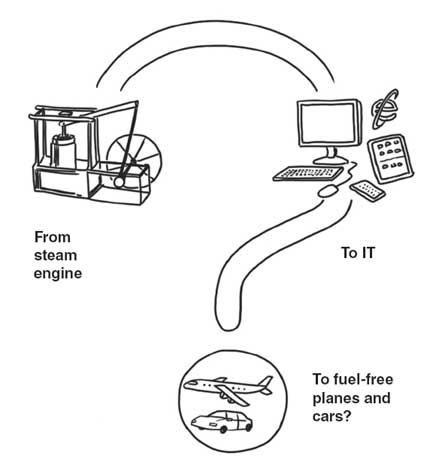Can a green revolution jump-start the economy?
 0 Comment(s)
0 Comment(s) Print
Print E-mail Shanghai Daily, May 23, 2012
E-mail Shanghai Daily, May 23, 2012
While austerity in Europe faces increasing social resistance, in principle it has the merit of simplicity. As the debate on fiscal consolidation versus growth intensifies, it is clear there is little agreement on how to kick-start the economy, beyond fielding broad stimulus packages.
|
|
|
[By Zhou Tao/Shanghai Daily] |
One idea is that environmental technology might feed a virtuous cycle of innovation and employment.
To some, green growth evokes a countryside covered with windmills and urban roofs lined with solar panels. But it is broader than that. For example, when Airbus moved from injection molding to 3D printing to produce the metal hinges for its airplanes' doors, it reduced their weight by half, yielding phenomenal savings in material and associated fuel consumption over a lifetime of flying those hinges around the world.
Still, it is easier to find exciting anecdotes than it is to show how they scale up to revitalizing an entire economy. Moreover, there is a great diversity of narratives on the green economy - and their proliferation is likely to grow.
This June, thousands of activists, policymakers, and business people will converge on Rio de Janeiro for the third giant United Nations Sustainable Development Conference (Rio+20). The conference will unleash new arguments about green jobs, growth, cost increases, cost reductions, changes in values, consumer choice - green this and green that. As a co-author of A New Growth Path for Europe, a report commissioned by the German government, I am guilty of contributing to this cacophony of complementary perspectives on green growth.
The European Climate Foundation had already published its Roadmap 2050, A Practical Guide to a Prosperous, Low-Carbon Europe. Since then, the UN Environment Program has released its Green Economy Report; McKinsey has written about the Resource Revolution; and the International Trade Unions Council has published Growing Green and Decent Jobs - to name but a few.
All take somewhat different approaches and offer different recommendations, making it hard for policymakers to see the forest through the trees.
Struggling economics
And, at the root of this multiplicity of perspectives lays the fact that economics struggles to explain how growth and innovation move an economy as a whole. The macroeconomic models on which policymakers depend are solid tools in times of smooth and incremental evolution, but green growth is not about gradual change.
For example, the European Union's goal of achieving an 80 percent reduction in greenhouse gas emissions by 2050 implies a complete overhaul of EU infrastructure in just a few decades. Economists' inability to model such rapid, radical change should not be taken as a condemnation of the discipline; it is simply a reflection of the state of our knowledge, and of the fact that the economy is really, really complicated. We simply do not yet have sufficiently precise insights into how all of its elements interact during times of far-reaching change, whether it be a financial crisis or a growth spurt.
Yet, the studies of green growth mentioned above all appear to provide such explanations. So, what do they really tell us?
In practice, each is limited to just one or two aspects of the economy, and describes how these interact.
Growing Green and Decent Jobs looks at the relationship between investment and jobs. A New Growth Path for Europe examines the impact of expectations and learning-by-doing.
Roadmap 2050 focuses on greening the power system. The authors then make a leap of faith to derive conclusions about the economy as a whole.
But, while the value of these studies is in the light that they shed on the parts, the ensuing headlines invariably are about the whole, articulated in terms of GDP and jobs. Each of the studies describes a part of a green economy, but none can capture the whole - not because they are deficient, but because it is simply beyond our capability.
That said, the fact that one cannot prove conclusively how green growth would work does not mean that we should give up on the idea. We know from history that waves of innovation, from the steam engine to the information and communications revolution, have led to dramatic increases in economic growth.
We cannot prove that a wave of environmental innovation will have a similar effect, but the studies of the parts make such an outcome highly plausible.
Ambiguous information
As humans, we are uniquely equipped to make decisions on the basis of ambiguous information - in fact, we do it all the time. When we choose a career or a spouse in our private lives, or when a politician seizes an opportunity from a plethora of possibilities, the task at hand is always about making highly consequential decisions based on imperfect information.
A big pile of green-growth reports demonstrates the plausibility of this path to recovery from an historic economic crisis. It is now up to us to realize its potential.
Green growth offers a realistic alternative to the faltering austerity approach to overcoming the current economic crisis. Policymakers should incorporate this thinking into the "beyond austerity" narrative that is taking shape in a growing number of key EU member states.
Roland Kupers is Research Director at THNK and Visiting Fellow at Oxford University. Copyright: Project Syndicate, 2012.www.project-syndicate.org






